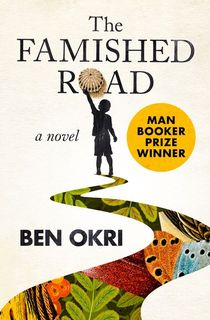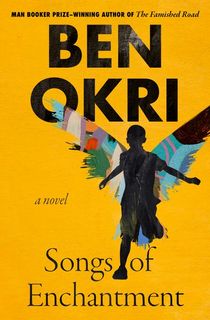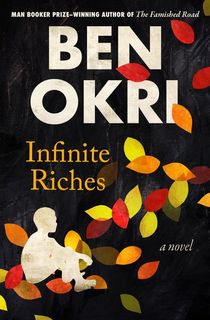Poet and novelist Ben Okri is best known for The Famished Road, his Man Booker Prize-winning novel published in 1991. Written with a mesmerizing blend of fabulism and gritty realism, the story of a spirit child named Azaro is still enchanting readers three decades later.
Often drawing comparisons with authors such as Gabriel García Márquez, Chinua Achebe and Salman Rushdie, Ben Okri's books and writing never fail to make us think. As author Ali Smith wrote, “Ben Okri is that rare thing, a literary and social visionary, a writer for whom all three—literature, culture, and vision—are profoundly interwoven.”
Recently, Early Bird Books reached out to Ben Okri to discuss his famous Famished Road trilogy, his writing style, and his most recent work, a prescient dystopian novel called The Freedom Artist.
1. You’ve said before that “the problem of realism is that it does not catch the full richness of reality.” How did this insight affect the storytelling style you chose for The Famished Road?
It had to be open yet clear, elastic yet precise, suggestive yet lucid. I needed a style responsive to the registers of the invisible, the numinous, the liminal, yet also the tactile, the physical, the real, open to dream and to things, capable of mercurial shifts yet always imbued with story.
Some people read me the wrong way. They shouldn’t just read for the story but also the mood, the music, the dance, the magic. People rush to get to the end. What’s the hurry? Take it slowly. Enjoy what is happening in between the lines. One book read well is better than ten read badly. One great love story with life is all you need. This is a book for deep divers and great lovers. If what you want is a quick fix, find something else more suitable and come back to The Famished Road when life has started to live in you.
This is a book about life and death, childhood and play, magic and suffering, beauty and love, mystery and spirit. It took me ten years to find the style needed for the special and never to be repeated dream. Think of the style as music—the music of being here, music of the stars, music of the beyond that is here, music of a unique consciousness that transforms everything because they have gone beyond everything.
In each book of The Famished Road trilogy the style and music and techniques are subtly different, to reflect the dominant theme of each book. But the spirit remains constant underneath.
2. What first inspired you to write a story about an abiku?
I altered the concept from ‘abiku’ to ‘spirit child.’ There’s a subtle difference. I wanted to tell a story that would enable me to talk about everything naturally, without straining. I wanted to catch all the levels of reality easily. I wanted to catch the ambiguities of being. I wanted to catch the essential spirit of all our realities. I wanted to tell a story that went beyond the illusory boundary of all things.
The western novel in various forms of realism was quite useless for this endeavor. It relies on sequentiality and the ultimate definition of the world by what you can feel and see. I wanted a new kind of narrative for the incredible world view I grew up with which transcended the limits that are such a fixed part of how the western cultures see the world. I realized that our sense of reality is cultural. We see what we are taught to see. But then people impose their seeing on others and insist it is the norm, the only way to see.
This happens all the time, the world over. This happened with art till Picasso banged the limits of his inheritance against African art. It still happens with the novel. Who is to say that there is only one way to write a novel? Plot, character, theme—who is to say they can’t be configured differently, that you can’t give the same pleasure, the same exploration, the same beauty in an entirely different way?
Art exists to transform our consciousness, to liberate us from the prison of our culture or our unquestioned inheritance. I wanted to burst open the gate for new possibilities of the novel and of being. It was an aesthetic, a living, political, spiritual, cultural project. I love the great western novels but they made me feel like I was living in a splendid but narrow house. I knew there was more to reality and to consciousness. I wanted to reach for more reality, more consciousness, to burst open to newer, higher spaces. And I did it not with explosives or a nuclear bomb, but with the consciousness of a child.
There’s much more to what I’m doing than meets the eye.
Related: The 19 Best Magical Realism Books You Haven't Read Yet
3. You’ve also said that "If my mother wanted to make a point, she wouldn't correct me, she'd tell me a story." What point do you hope readers take from the Famished Road trilogy?
I never write prescriptively. What you take from it is what you find. You find in it what you bring to it. If you find more there is more. I write the levels, the dimensions, the here, the in and the out. I write the stories so they resonate many things in the one. I do elliptical and the suggestive. I do the stuff you see out of the corner of your eyes. But when you look they’re not there. This is spirit stuff. The stuff of life before we try and over-order it with our reason and our intellect.
My mother’s technique was a magical one for it made me always respond imaginatively to life. Made me always responsive and alert to the many ways that life talks to us. Often we don’t hear the direct stuff. You can’t tell people what they need to hear. They are the only ones who can discover that for themselves. My art is the art of empowering people’s own creativity, their own intelligence and intuition, their own rebellion. I prefer to awaken rather than to tell. I’d rather take you to the place where miracles are possible. But you have to choose to be open to them.
I don’t believe in the tyrannical style that tells you that the writer is cleverer than you are. I don’t believe in intellectual bullies. The culture is full of them. The really intelligent writer doesn’t need to show it. It should be there in the richness, the unexpected dimensions of what they write. You should discover it yourself the more deeply you examine their work and their world. Deep waters often don’t look it.
My mother’s technique took me decades to understand. It was ultimately the highest sign of respect, a profound trust in a child’s own intelligence. Especially so when you realize it would have been much easier for her to do otherwise, to be constantly correcting and telling me off. Doing it through story was the most generous investment in my future. Stories that have true mystery have no end in what they yield, in what they awaken.
4. Your most recent novel, The Freedom Artist, is a dystopian story that describes a world where, among many other horrors, people no longer read anything that requires thought. Do you think our current society is headed in this direction?
You start by asking things to be easy and end by refusing to think. That’s how the world ends. With our refusal to think. Evil becomes possible when we refuse to think. We become easy to manipulate. And then one day we find we have lost control of our lives, our freedoms, our world. The fact of being alive means we have a responsibility to life. We can’t escape the responsibility of thinking, of asking questions. A piece of writing can appear simple, but if it is any good it will make you think. In the end you will find it is not so simple after all.
I don’t want to fetishize difficulty. A lot of writing that appears difficult has done all the work for you. The writer has given you all their thinking so you don’t have to think. All you have to do is admire. Whether the writing is difficult or easy is not what counts. What counts is the implication. Where it leads. No one can do our thinking for us. And no thinking that is done for us can ever liberate us. We must do it ourselves.
In The Freedom Artist I wanted to take the reader to a strange place. It is for the reader to discover whether this strange place is somewhere else or whether it is here. And what the implications are if that were true. The world feels different when you realize that what you thought was solid ground is actually the sliding edge of a precipice.
5. What’s the last book you read that you wanted to tell the world about?
Bliz-aard Ball Sale by Elena Filipovic. It’s about an artist who sold snowballs during a blizzard in New York. One of the greatest artistic moments of the twentieth century. The artist, of course, is David Hammons.
Ben Okri Books

The Famished Road
Winner of the Man Booker Prize: “Okri shares with García Márquez a vision of the world as one of infinite possibility . . . A masterpiece” (The Boston Sunday Globe).
Azaro is a spirit child, an abiku, existing, according to the African tradition, between life and death. Born into the human world, he must experience its joys and tragedies. His spirit companions come to him often, hounding him to leave his mortal world and join them in their idyllic one. Azaro foresees a trying life ahead, but he is born smiling. This is his story.

Songs of Enchantment
Set in an African village, this follow-up to the Man Booker Prize–winning novel is “sometimes whimsical, sometimes bawdy . . . Fraught with wild visions” (The Times).
“All is not well in the African village where Azaro lives. The child narrator of poet and novelist Okri’s The Famished Road, who had outwitted death in the previous book, again relates the oppressive events that continue to plague his village and his family. While political factionalization shatters the community's cohesiveness, the prodigious bar owner Madame Koto, chief exponent of the ‘Party of the Rich,’ alternately exudes portentous metaphysical malaise and miraculous erotic force. Little Azaro, himself touched and distracted by a series of animuses, follows the heels of ‘dad,’ who is a resounding vessel, by turns, of cantankerous egotism and abased self-sacrifice. This Nigerian epic reveals a violent provincial world, opaque with magical spirits which place horrendous ethical demands on fragile and fickle humanity, as if to test each individual for a thread of virtuous constancy at the core. Events drench the essentially linear narrative with all the ruthless sensuousness of a tropical storm, and Okri’s prose is lucid and deft.” —Publishers Weekly

Infinite Riches
A potent combination of political, metaphorical, and mythical storytelling” from the prizewinning author of The Freedom Artist (The Scotsman).
“Who can be certain where the end begins?” said Dad, shortly before he was arrested for the murder of the carpenter . . .
This novel, the conclusion to the trilogy that began with the Man Booker Prize winner The Famished Road, follows the spirit-child Azaro, who travels between the worlds of the living and the dead. Set against the backdrop of a Nigerian village in turmoil, it is a novel about the multiple forms that wealth and power can take, the challenges of the physical world, and the wonders of the mystical world, by an author who has earned numerous literary honors and whose “writing is hailed for its intelligence, tenderness, poeticism and luminosity” (Financial Times).
